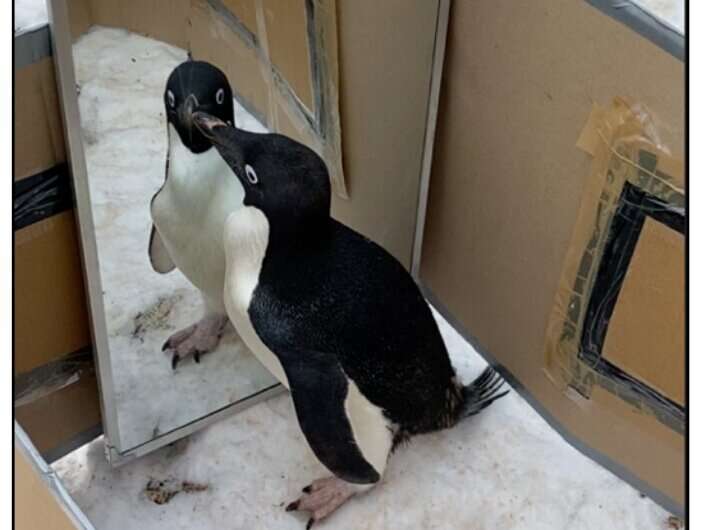Mirror test of wild penguins suggests they may possess self-awareness
A trio of researchers—one with the Indian government's Ministry of Earth Sciences, another with the Indian Institute of Technology Bombay and the third with the National Institute of Advanced Studies, also in India—has found that some species of wild penguins may have some degree of self-awareness.
Prabir Ghosh Dastidar, Azizuddin Khan and Anindya Sinha have written a paper describing their study of the behavior of Adélie penguins in Antarctica and what they learned in their effort. The full paper is available on the bioRxiv preprint server.
Prior research has shown that self-awareness is rare in the animal kingdom—up to now, only a few mammals, some birds and some fish have been found to have it. In humans it is an easy thing to test, but in animals it takes some doing. Most studies looking for it have used what is known as the mirror test, where as its name suggests, test animals are allowed to see themselves in a mirror while researchers study their reactions.
Self-awareness generally involves subjects noting something about themselves that is also in their reflection, such as touching a red mark on their own face that they can only see in the mirror. In this new effort, the researchers wondered if penguins might have self-awareness. To find out they ventured to Svenner Island in a part of eastern Antarctica to observe the behavior of Adélie penguins responding to images of themselves in mirrors.
The researchers conducted four experiments, The first involved simply placing some mirrors on the ground in the vicinity of the penguins and watching as random penguins looked down at them. The second involved building a cardboard corral around some of the penguins that directed them toward mirrors at the ends of an enclosure. The third involved placing little stickers on the mirrors that when viewed, appeared as if it was on the penguin looking at it. The final experiment involved placing a bib on random penguins placed in front of a mirror.
The researchers found no response in the first experiment, which was actually a finding—many animals fail such a test when they believe the creature they are seeing in the mirror is another of their kind and respond accordingly. In the second experiment, the penguins moved in ways that suggested they might be examining themselves. The penguins also become agitated when looking at the mirrors with stickers on them and actively tried to remove them. But they did not respond at all to seeing themselves wearing a small bib.
The researchers suggest their results are a bit ambiguous, but note that taken together, their findings suggest that the penguins did exhibit some degree of self-awareness.
More information: Prabir Ghosh Dastidar et al, Possible Self-awareness in Wild Adélie PenguinsPygoscelis adeliae, bioRxiv (2022). DOI: 10.1101/2022.11.04.515260
© 2022 Science X NetworkThis robot lives with an Antarctica penguin colony, monitoring their every move

No comments:
Post a Comment